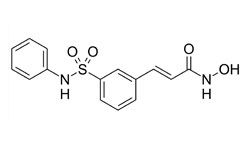Belinostat Receives Priority Review for Advanced Peripheral T-Cell Lymphoma
The intravenous pan-HDAC inhibitor belinostat (Beleodaq) as a treatment for patients with relapsed or refractory peripheral T-cell lymphoma (PTCL) has received a priority review designation from the FDA.
Chemical structure of belinostat

The intravenous pan-HDAC inhibitor belinostat (Beleodaq) as a treatment for patients with relapsed or refractory peripheral T-cell lymphoma (PTCL) has received a priority review designation from the FDA. The FDA plans to take action on the drug's application by August 9, 2014, according to an announcement from Spectrum Pharmaceuticals, the company developing the drug.
The priority review was granted based on findings from the single arm phase II BELIEF study in which treatment with belinostat resulted in an overall response rate (ORR) of 26%-28% in patients with relapsed or refractory PTCL following progression on at least one prior therapy. Moreover, even patients with low platelet counts experienced responses with a low incidence of myelosuppression, representing the potential for future combination strategies.
“The Priority Review designation for the Beleodaq NDA acknowledges the potential significant improvement in its safety or effectiveness for the treatment for patients with the serious condition of relapsed or refractory PTCLs when compared to standard applications,” said Rajesh C. Shrotriya, MD, chairman, chief executive officer, and president of Spectrum Pharmaceuticals.
Belinostat (formerly PXD101) is a novel pan-HDAC inhibitor with antineoplastic activity. The agent targets HDAC enzymes, which may prevent cellular proliferation and induce apoptosis.
Prior to the priority review, belinostat was granted Orphan Drug and Fast Track designations. The phase II trial was conducted under an FDA Special Protocol Assessment. The primary endpoint of the trial was centrally reviewed ORR. Results from the study were presented at the 2013 ASCO Annual Meeting.
In the trial, 129 patients with relapsed or refractory PTCL and platelets ≥ 50,000/µL received intravenous belinostat at 1000 mg/m2on days 1-5 of a 3-week cycle for a median of 2 cycles. Patients in the trial had received a median of 2 prior therapies, including CHOP (96%) and stem cell transplantation (23%).
For patients with centrally confirmed PTCL (n = 120), the ORR was 26% (CR = 10%; PR = 16%). For patients with baseline platelets ≥100,000/μL (n = 100), the ORR was 28% (CR = 11%; PR = 17%). The median time to response was 5.6 weeks and the median duration of response was 8.3 months. The longest duration of response in the trial was 29.4 months.
“Importantly, several patients treated with Beleodaq were able to go on to potentially curative stem cell transplantation,” Shrotriya said in a release. “Since approximately 70% of relapsed or refractory PTCL patients fail the currently approved treatments in the course of their therapy, Beleodaq could be an important additional treatment option for these patients.”
The most common treatment-related grade 3/4 adverse events were thrombocytopenia (13%), neutropenia (13%), anemia (10%), dyspnea (6%), pneumonia (6%), and fatigue (5%).
Belinostat is currently under investigation as an oral and intravenous medication for PTCL, carcinoma of unknown primary origin, non-small cell lung cancer, and other solid and hematologic tumors. In other indications, the drug is typically administered in combination with carboplatin and paclitaxel. To date, over 1,000 patients have received treatment with belinostat in the clinical development program for the drug.
Examining the Non-Hodgkin Lymphoma Treatment Paradigm
July 15th 2022In season 3, episode 6 of Targeted Talks, Yazan Samhouri, MD, discusses the exciting new agents for the treatment of non-Hodgkin lymphoma, the clinical trials that support their use, and hopes for the future of treatment.
Listen









